Lean transformation is never just about tools, it’s about people. At its core, Lean is about creating environments where individuals feel safe to speak up, solve problems, and drive improvement. Trust and psychological safety are the foundations that allow teams to take risks, learn from mistakes, and innovate without fear.
Why Trust Matters in Transformation
Trust is the foundation of sustainable Lean transformation. Without psychological safety—the belief that people can raise concerns and take risks without fear—continuous improvement stalls. As Stephen M.R. Covey explains in The Speed of Trust, when trust is present, speed increases, costs decrease, and execution improves. This becomes even more critical during times of disruption, such as after a merger or acquisition, when employees are already uncertain about the future.
When Passion Turns to Apathy
In moments of uncertainty, engaged employees can quickly turn silent when trust erodes. Passion turns into apathy, often triggered by familiar signals: decisions made far from the Gemba, leaders rarely showing up in person, or promises made and broken. As W. Edwards Deming warned, leaders must ‘drive out fear’ so people can work effectively. Fear silences voices, while trust encourages collaboration, problem-solving, and innovation.
Leadership Behaviors That Build Trust
Leaders play a direct role in shaping the level of trust within their organizations. Consistency, respect for people, and visibility are what build credibility over time. Patrick Lencioni’s Five Dysfunctions of a Team reinforces this: trust is the foundation of teamwork. Without it, problems remain hidden and the status quo persists. With it, teams feel safe admitting mistakes, asking for help, and pursuing improvement.
Three key leadership behaviors that build trust:
- Be Visible – Spend time at the Gemba to learn, not just inspect.
- Be Present – Don’t manage by dashboard alone, engage directly with teams.
- Deliver on Promises – Small commitments kept consistently compound into credibility.
Restoring Trust When It’s Broken
Even with the best intentions, trust is fragile and can be lost quickly. It does not rebuild on its own; leaders must take deliberate steps to repair it. Acknowledging gaps, clarifying intent, and delivering early wins can restore credibility. Leaders who show humility in recognizing shortcomings and discipline in following through demonstrate that promises can be trusted again.
Key actions to rebuild trust include:
- Acknowledge the Gap – Admit where promises have fallen short without spin.
- Create Urgency with Empathy – Balance the ‘why’ of change with care for disruption.
- Clarify Intent and Vision – Connect tough decisions to a shared future.
- Deliver Early Wins – Fix something meaningful to employees quickly.
- Open Safe Forums – Use huddles or town halls to encourage honest dialogue.
- Sustain with Systems – Standard gemba walks and leadership routines make trust stick.
Why This Matters
Rebuilding trust is not a “soft skill” – it is a performance driver. High-trust cultures stabilize retention, accelerate problem-solving, and reduce the need for oversight. As Deming emphasized, driving out fear creates honest signals, real learning, and better results. Trust is the fuel that transforms Lean from a set of tools into a lasting cultural shift.
The challenge for leaders is not just to implement processes but to create environments where people feel safe to contribute, experiment, and own improvement. Ask yourself: Are you visible where value is created? Which small promise can you fulfill this week to build credibility? Whose passion has dimmed, and how can you reignite it at the Gemba?
Lean thrives where trust and psychological safety are present. Build that foundation, and you enable your people, and your organization, to achieve sustainable results that last. And if you need an unbiased third party to help facilitate these trust-building conversations, reach out, we’d be glad to support your journey.


